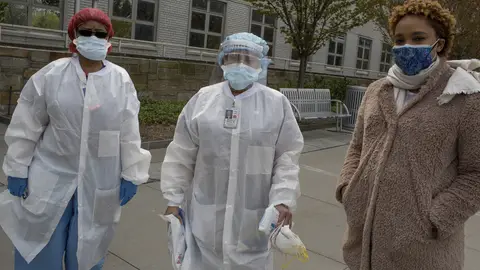This Bill Could Forgive Student Loan Debt For Doctors And Nurses On Coronavirus Frontlines

As doctors, nurses, and other health care workers risk their lives to save the thousands of people with severe COVID-19 symptoms, they're often made to do so with subpar or makeshift personal protective equipment (PPE), grueling shifts, and a rapidly depleting store of necessary medication. Many have shifted their living situations to minimize the risk of their loved ones becoming sick, and others have stood up to orchestrated anti-social distancing protestors who are advocating for practices that would potentially result in thousands more people becoming sick with a virus for which there is currently no known vaccine. In short, they're putting up with a lot — and a lot of things that they say they never signed up for when they chose their career paths.
Now, many of them are lobbying the federal government to take more meaningful action than simply calling them "heroes": They want their student loan debts forgiven.
A MoveOn petition started three weeks ago has amassed over 500,000 signatures; addressed to Senate majority leader Mitch McConnell (R-KY) and Senate minority leader Chuck Schumer (D-NY), as well as Speaker of the House Nancy Pelosi (D-CA) and House minority leader Kevin McCarthy (R-CA), the petition asks lawmakers to "include loan forgiveness for all health professionals" in the next stimulus package because those workers "are doing heroic and selfless service to our country. After World War II, Congress thanked our soldiers by passing the GI Bill so that they could get a college education. This would be the same." A separate Change.org petition, directed at President Donald Trump and congressional leaders, has garnered over 250,000 signatures.
According to data from the Association of American Medical Professionals released in October 2019, a total of 73 percent of medical students graduate with student loan debt, and their average debt clocks in at $201,490. The American Association of Colleges of Nursing reported in 2017 that, on average, nurses graduate their programs with anywhere from $40,000 and $54,999 in debt, and that can take decades to pay off: A 2019 Medscape survey found that 20 percent of nurses aged 55 or older were still paying off their student loans.
"We want to go out and take care of people. Nobody becomes a doctor for the money," Dr. Andrew Tisser, an emergency physician in New York who signed the Change.org petition, told NBC News.
Like many inequities laid bare by the coronavirus pandemic, the severe debt saddling health care workers has only exacerbated already strained systems. In 2017, NPR reported on a shortage of doctors in rural areas, given that many cannot afford to open their own practices and continue to pay their student loan debt. Some states have already proven that relief is possible: In 2019, California introduced a new program that would relieve doctors of up to $300,000 in student loan debt if they agree to take Medi-Cal insurance for low-income patients. And while some health care providers use the Public Service Loan Forgiveness program to work towards loan forgiveness, few people were approved for such forgiveness between 2018 and 2019, largely owing to a paperwork technicality.
On April 12, Representative Carolyn Maloney (D-NY) said she plans to introduce the Student Debt Forgiveness for Frontline Health Care Workers Act, which would "eliminate graduate school debt for health care workers who are providing direct patient care in response to the COVID-19 pandemic."
"The least we can do to recognize their service is to forgive their graduate student loan debt so that they are not forced to worry about their financial wellbeing in addition to their health and the health of their families while they respond to a public health emergency," she said in a statement.
And while Governor Andrew Cuomo (D-NY) has similarly called for frontline workers to receive hazard pay during the pandemic, some doctors don't believe an overtime strategy is enough.
"I'm looking at a student loan debt of $318,000," Dr. Manuel "Trey" Penton III, a pediatric infectious disease physician in New York, told ABC News. "That few extra thousand dollars, while it may make a big difference to some people, for me, most of that money is going to go back into paying off my student loan debt.
Elizabeth May, another physician in New York, agreed: "Four years into residency, and approximately $20,000 in loan payments later, I am still scraping away at the interest," of the debt she accrued in medical school, she wrote for The Intercept. "I owe more than when I graduated."





